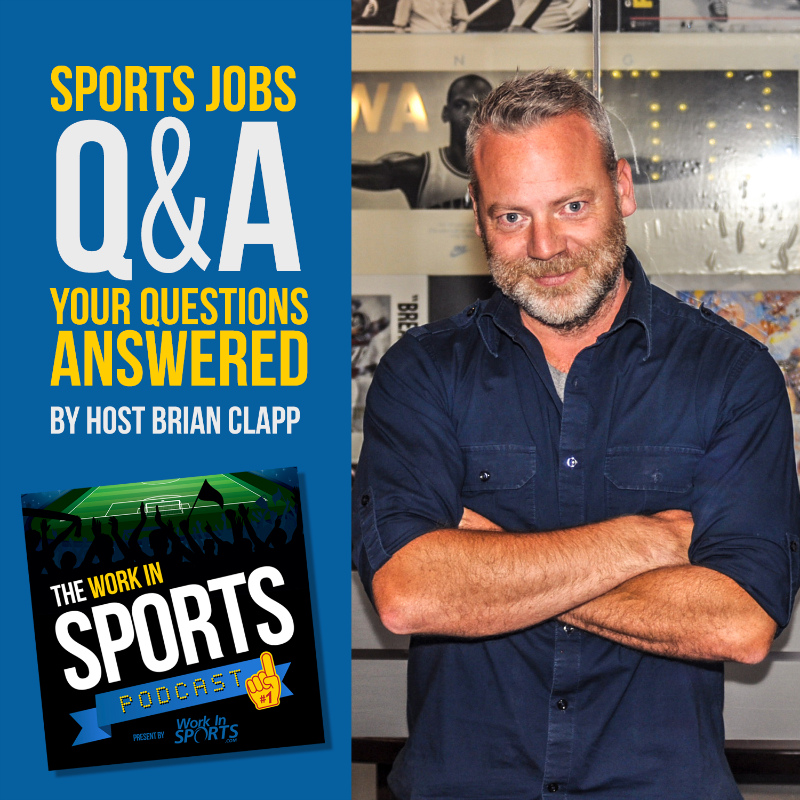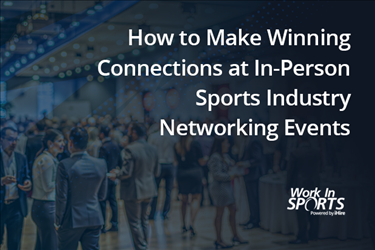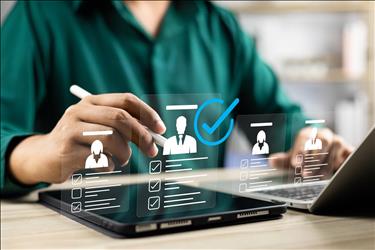- Job Seeker Resources
- |
- Last Updated: April 14, 2023

The Secret Weapon You Aren't Utilizing Enough - Work In Sports Podcast
Hey everybody, I’m Brian Clapp VP of Content and Engaged learning for WorkInSports.com and this is the Work In Sports podcast…
I apologize for not having a Friday podcast last week. I have to say, Friday was the first day of this quarantine that my kids were really struggling. They’ve been incredible this whole time, but they are young, this is really weird, and it felt like Friday it all caught up to them at once.
It was rainy and cold, the sky was grey all day...and all three just looked miserable. So I skipped the podcast, bailed on a few meetings I was supposed to have, including a podcast interview with Averee Dovsek from PGA Tour Radio which we are going to do this Friday instead.
Averee is a cool story -- she’s in college, a D1 golfer on the women’s team at Hofstra, and has also done some very high profile internships with golf channel and PGA tour radio...and during the pandemic, rather than sit around blaming the world for h er season coming to an end, and her internship with PGA Tour radio...she started a podcast.
er season coming to an end, and her internship with PGA Tour radio...she started a podcast.
She reminds me of some of my previous guests like Carlton Robie, Dasmine Evans and Jake Kernan -- driven, focused, and willing. Those are great attributes when you are trying to get into this business.
Anyway, Averee’s interview will be live in two weeks, this week on Wednesday is Ari Kaplan, one of the pioneers of baseball analytics. I don’t say that lightly, he is a pioneer in baseball analytics and data science. He’s worked or consulted for every major league team - and he shares a bunch of really fun stories, great career advice, and insight into what is happening now in the world of data science and analytics.
I know many of you in our audience will get pretty geeked up about this one, I know I did. Just one more note, Ari speaks on these intricate subjects in such a deliberate manner, he makes it easy to understand complex information. As he puts it, you can’t talk to a manager or GM in spreadsheets, you have to translate and explain… which he does so so well in this interview.
This whole tangent started with me explaining why I missed the podcast on Friday. And it’s to make this point. We all make choices every day, don’t forget to make choices for yourself or those who rely on you most. Sometimes, you need to be you the person, more than you the worker.
OK, let’s move along…
The question today comes in from Jonny in Los Angeles… Jonny writes
“Hey Brian, I feel like you are my trusted advisor even though you don’t know me personally. I listen intently to what you share, and since your advice has so often been proven true in my life, I trust you implicitly.
My question - the advice you hear all around the internet is that during this time you should be doing more informational interviews with people in the industry. While this advice seems legit, I ask you, how? Like, how do you set them up, what do you ask, what are the goals, and how should I set this up for success? I’m just not quite sure I understand why they are valuable.”
Jonny, your question basically wrote my outline for me… how do you do it, why do you do it, what questions do you ask and what does success look like.
Like seriously, that’s how I outline just about every talk. How, why, what and what does it look like when it works. Thanks for doing my work for me :)
Ok, so let's talk about informational interviews.
Right now for most of you, the sports world seems like an incredibly large space. Tons of people, different jobs, lots of teams leagues and organizations that support the industry and it’s athletes.
But here’s the deal, those of us that have been in the industry for a long time feel like it’s a small world, everyone is interconnected, and the overlap in roles and responsibilities is ever-present.
We’ve shrunken this daunting world by getting to know the people. I tell this all the time, I worked with 250 other people at CNN/Sports Illustrated when I got started -- and then when these people ventured out into other roles I had connections at NBC Sports, ESPN Big Ten Network, PAC-12 Network, Fox Sports etc.
You likely don’t have that right now which is why the industry feels huge.
Informational interviews, and networking/relationship building, is how you start making the sports world seem a little smaller and more connected. Plus, you learn from someone in the industry -- informational interviews are the absolute best way to learn the specifics of a role from someone actively doing it.
If you think of it, my interviews on Wednesdays are like me conducting an informational interview for you. I’m finding out the intricacies of their roles, asking them questions about their day-to-day, what they studied, how they got there, what advice they have -- I’ve done the research, and ask the questions for you.
This is WHY you do informational interviews, you build connections and you learn.
Informational interviews are an underutilized tool for advancing your sports career, building your network, and clearing up some of the career confusion running rampant in your mind.
Now that you understand the why, let’s get into the how. Don’t Start Calling Anyone Yet…
Before you reach out to anyone, there is one task you have to do — check your social media presence.
Whenever someone reaches out to me for a short call, I immediately check their Twitter and Linkedin before responding, and I ask myself:
- Is this someone I want to invest 20-40 minutes of my time with?
- Does this person present themselves in a favorable light?
- Is their Twitter profile a picture partying with a few buddies?
- Can I see from their LinkedIn that he/she takes themselves seriously?
For you to have a moderately successful response rate in conducting informational interviews, you have to position yourself accordingly.
Create an Outreach Plan
Once your social media presence looks clean and professional, you can begin the process of reaching out to people.
Your initial correspondence should be brief and to the point. No one will read a drawn-out 500-word email about how much you love sports and why you want to work in sports. Your carefully crafted monologue will be deleted before ever being considered.
Remember, this informational interview is not about you; it is about the person you are reaching out to. Keep your email between three and five sentences — name, school, internship/job if you have one, and why you chose to reach out to them.
The last point is essential.
Ego plays a role in getting a response if you explain why speaking to them, in particular, is essential, you are much more likely to get an answer. Remember to cite specific reasons, don’t let your correspondence seem like it could have been sent to 100 other people.
If you are reaching out to someone who works for a team or league, be mindful if they are in season. If you want to get in touch with someone at the New York Mets, you might be better off trying to schedule an interview during the winter months versus the middle of summer.
Once you have sent off your emails to a few individuals, you wait…and wait. Often, because of the person’s busy schedule, they might not get back to you — and that is ok. If your response rate is anywhere near 1 in 3 emails, I would say you are doing fine.
What to do When Someone Says ‘Yes.’
So, you finally receive a ‘yes’ response from someone in the marketing department with the Brooklyn Nets - congrats!
What types of questions are you going to ask them? What should you talk about? How much will you speak?
The first step is research.
- Research the person on Linkedin/Twitter – understand their tone, are they witty? Serious? Detail-oriented?
- Look at their biography on their company page and learn their history. Where have they worked? What are the parameters of their current role? Do you have common ground that could act as an ice breaker?
- Prepare a list of 5-10 questions that you’ll want to ask. Even with the prepared questions, the conversation should still be fluid.
Examples of questions you might ask include:
- why did you decide to work in sports?
- Do you suggest any sports marketing conferences to attend?
- What skill do you use the most in the day to day of your job?
- What motivated you to attend graduate school?
- What is the most challenging part of your job?
I publish all of my questions in the show notes of every podcast interview, go to workinsports.com/blog and find an episode that relates to your upcoming informational interview and use some of my ideas!
The general rule -- The more research you conduct about a person, the better the conversation will go. I spend hours researching my interview subjects, their lives, articles written on them, places they’ve been quoted...in order to formulate intelligent questions.
You need to do the same.
Also if you notice, during the Monday podcasts I talk and talk and talk. During the Wednesday podcasts, I ask a question...then shut up and listen. I speak less than 20% of the time. That is the rhythm you want for your informational interviews.
The key thing to remember when you formulate questions is -- what do you really need and want to know.
I spoke with someone who did an informational interview with Adam Schefter once, and I reviewed their questions beforehand. They had a couple of questions in there about free agency… like, do you think player X will sign with team Y?
And I was mad. I’m like -- how does this information help you? Does this answer get you closer to your career goals? Why don’t you ask him how he develops league sources? how he gets information? How he became a great writer?
Those questions lead to answers that help you -- don’t ask salacious or superficial things -- questions need to have meat on the bone.
I swear to you after every podcast interview my guests tell me how much they enjoyed the questions. That’s because I put in the work, and you know what ...they respect me, and the experience, afterward.
The conversation is over, you thank the person, and that is that, right?
Wrong.
Following up with an email 3-4 hours after your call and thanking them once again is a must. Sending a handwritten ‘thank you’ note to the person is even better.
Even after you have done this, it is imperative that you continue the conversation and stay in touch. The closer you keep in contact with them the better your chances are that they’ll tell you, or better yet, recommend you, if they hear of a job opportunity.
Touching base every 6-10 weeks is essential, remember to bring something to the conversation other than ‘have you heard of any jobs?’
People will tire of you quickly if that is all that comes from your side of the conversation. You might come across an article titled ’10 Habits of Successful Sports Marketers’ and decide to pass that article along to them, or, you might reach out and wish them a Happy New Year.
Now that you have a better understanding of what an informational interview is and how it can benefit you, it is time to take action. Set a goal to reach out to two to four individuals each week, with the hopes of having one phone call each week with someone in the sports industry that you admire.
Ok, Jonny I hope that breaks it down for you… informational interviews can be a secret weapon during this time… use them wisely
Tune in on Wednesday to hear from Ari Kaplan, Baseball Analytics pioneer, it’s a great interview.
Please rate and review the podcast wherever you listen, it helps us gain new listeners, which is important to the growth of this show!
I appreciate all of you -- stay safe!

Originally Published: April 27, 2020
Sign In or Register to access all articles and insider tips for help in your job search.
Search for Sports Jobs
RELATED JOBS
Job Description : Instruct/ coach and support student- athletes in the fundamental skills,...
Assistant Golf ProfessionalThe Assistant Golf Professional plays an essential role in supporting the Head Golf Professional...
Basketball (Girls) - Assistant Coach (.5)This position is a one-year supplemental contract at Big Walnut High School beginning the...
Middle School Boys Volleyball Head CoachPrior volleyball playing or coaching experience required Prior collegiate volleyball playing...
Head 7th Grade Softball CoachUPPER ARLINGTON CITY SCHOOLS Upper Arlington City School District Position: 7th Grade Head...
RELATED RESOURCES
Find the Right Job Faster
- Get personalized job matches sent to your inbox every day
- Connect directly with employers before your competition
- Advance your career with expert advice on interviewing, salary negotiation, and more
We value your privacy




